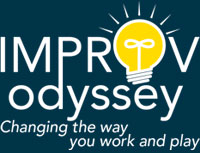Story, story…LIVE!
The game of Building a Story is a staple with improv groups around the world. It is the essence of collaboration by building a story one word at a time and by sharing ideas using give and take and intense listening. Invariably, the challenge wakes you up and your focus becomes stronger. There are many.. read more →
The Magic Bond of Playing
After 35 years of playing Spolin Games with various groups, I’ve noticed an interesting thing. I am struck by the fact that these groups as a result of playing together for an extended period, keep in touch with each other and often come together to play as opportunity permits. My first observation of this phenomenon.. read more →
The Difference between Spolin Games and Popular Improv
There is a profundity in Spolin’s work that is hard to capture and commoditize. It cannot be learned intellectually, but must be experienced firsthand to really be understood. There are only a handful of teachers carrying on her tradition, myself being one of them.
Improvisation began with Spolin. But other popular forms have emerged as more popular and have swept the world. I will try to explain the reason for this. read more →
Improv – The Long and the Short of It
Short Form and Long Form are the same The distinction between short form and long form is a development that stems from the going awry or misunderstanding the focus of a game. These terms get bandied about as if they are two separate disciplines. They are not. Spolin used these games as exercises to help.. read more →
Show! Don’t Tell!
When you don’t see where you are, all you can do is talk about it. You get a suggestion for a scene: Who — A husband and wife. Where — at Disneyland. What — waiting to get on a ride. Most players will begin the scene with dialogue something like this. Husband: Well, well, dear.. read more →
The Seduction of the Teacher
The Trap “Students who regard an instructor highly will tend to adopt that instructor’s attitudes, orientations, and values. This is a seductive phenomenon because it can lead to the ego-enhancement of instructors who have not reached full psychological maturity. This ‘ego-stroking’ can then motivate instructor behaviors which do not have the personal development of participants.. read more →
Beginner’s Mind
Beginner’s Mind “In the beginner’s mind there are many possibilities, but in the expert’s there are few…” Zen master Shunryu Suzuki Beginner’s mind is experiencing a thing for the first time. “Firsts” are always memorable. Improvisation is a constant search for ‘first times’. I once did a wonderful improv scene in Viola’s class using the.. read more →
Does Teaching mean you have to be Mean?
Michael wrote as a comment to me regarding another post: Is it my imagination or did a lot of the famous improv teachers yell at their students? Sounds like Viola did. People said Del Close was often a huge dick to his students. Keith Johnstone was famous for calling a student’s work horrible and telling.. read more →
The Power of Play and the Need for Playing
Play creates happy emotional condition of the organism-as-a-whole. Play involves social values, as does no other behavior. The spirit of play develops social adaptability, ethics, mental and emotional control, and imagination. These are the more complex adjustments a child learns through play. In play, there are adjustments to new situations constantly. Play experience can prepare.. read more →
A Question of Evaluating Students
I recently got a letter from a teacher who uses Spolin Games in the classroom. She asked an interesting question: …Here’s my question: what theatre game would you recommend I use in evaluating the ability level or strength of a 4-6 grader performing improvisation? In other words, which game might let me know which student.. read more →









